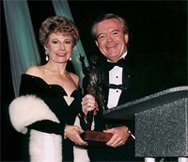Want to Know the Secrets of a Hall of Fame Keynote Speaker? 
Million Dollar Consultant Alan Weiss, PhD, CPAE, CMC interviews Patricia Fripp
When and how did you begin speaking professionally (for a fee)?
In 1975, a hairstyling company called Markham paid me $350 a day for hairstyling demonstrations. What set me apart from other stylists was the fact I could cut hair for four hours and talk the entire time! I realized the people in the back could not really see what I was doing. Therefore, I had to describe what I was doing in a way that they thought they could see. To keep their attention, I also told them how to sell more, interview potential employees, and promote and market. The speaking part of the program was so successful Markham extended the training to a second day on management and motivation. Since I was the star of my Dale Carnegie class and attended Toastmasters, I knew how to organize my remarks without notes.
 At the same time, my executive clients invited me to speak to their service clubs, staff meetings, and small conferences. Because of my personality and expertise at cutting their hair, my clients thought I would be a pretty good speaker. However, without exception, they were amazed how good! Many of my first free or low-fee talks to their companies eventually led to major long-term relationships.
At the same time, my executive clients invited me to speak to their service clubs, staff meetings, and small conferences. Because of my personality and expertise at cutting their hair, my clients thought I would be a pretty good speaker. However, without exception, they were amazed how good! Many of my first free or low-fee talks to their companies eventually led to major long-term relationships.
For example, the first time I spoke to Bob Kessler’s team at the San Francisco office of Moore Business Forms, he paid me $75 in Moore business forms. Throughout the years as he got promoted, he hired me multiple times in many cities. The last time was to keynote a convention in Hawaii to sales professionals from sixteen countries with name entertainment. Shame he retired!
In 1984 when I finally retired from hairstyling and was a full-time professional speaker, I was hired to speak to AT&T National Account managers. I was referred by Gary Hickox who, at age twenty-seven, impressed his boss by bringing in a top motivational speaker to speak at a small team meeting. His hairstylist! In 2010, twenty-six years later, we still keep in touch.
At Rotary Club speeches marketing my salon I was asked, “What would you charge to say that to the Oakland Appliance Dealers?” “$50!” The next request was to speak on goal setting to the San Mateo School Administrators. I replied, “$50 an hour and travel time.” He offered me $125! Incidentally, the next time the same gentleman asked, “What would you charge to say that to the Oakland Appliance Dealers?” he paid me $5,000.
In 1977, I attended my first NSA convention and realized I could one day be a speaker.
How did you choose your early topics, since your prior career was as a hairdresser?
Alan, we teach speakers you get paid for what you know. You get paid well when you deliver what you know with impact. I realized I was an expert at building a small or medium size business.
My early topics were the result of what I did on a daily basis, “How to Get, Keep, and Deserve Customers” and “How to Promote Business.”
Read More...

 At the same time, my executive clients invited me to speak to their service clubs, staff meetings, and small conferences. Because of my personality and expertise at cutting their hair, my clients thought I would be a pretty good speaker. However, without exception, they were amazed how good! Many of my first free or low-fee talks to their companies eventually led to major long-term relationships.
At the same time, my executive clients invited me to speak to their service clubs, staff meetings, and small conferences. Because of my personality and expertise at cutting their hair, my clients thought I would be a pretty good speaker. However, without exception, they were amazed how good! Many of my first free or low-fee talks to their companies eventually led to major long-term relationships.
